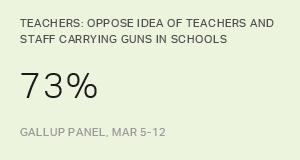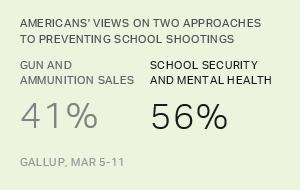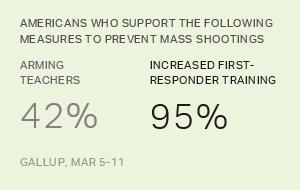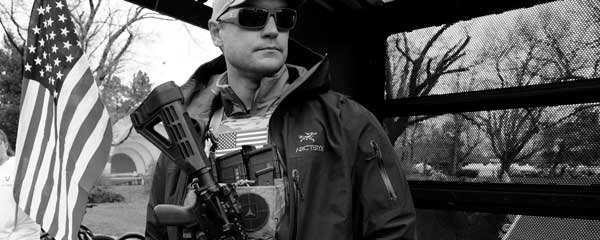Story Highlights
- Stricter gun laws, assault weapons bans mentioned most often
- Expanded background checks, assault weapons bans seen as most effective
This story is part of a special series on U.S. teachers' views of carrying guns and school safety.
WASHINGTON, D.C. -- U.S. teachers are much more likely to see restrictions on gun ownership as the best way to prevent school shootings over any other approach. Asked in an open-ended format what could be done to prevent U.S. school shootings, 33% mention stricter gun laws, 22% say a ban on assault weapons or other types of guns, and 10% say stricter background checks on gun purchases. About one in five teachers mention better funding for mental health services and another 6% say to make more mental health resources available in schools. Fifteen percent see improved school security as the best way to prevent shootings.
| % Mentioning | |||||||||||||||||||||||||||||||||||||||||||||||||||||||||||||||||||||||||||||||||||||||||||||||||||
|---|---|---|---|---|---|---|---|---|---|---|---|---|---|---|---|---|---|---|---|---|---|---|---|---|---|---|---|---|---|---|---|---|---|---|---|---|---|---|---|---|---|---|---|---|---|---|---|---|---|---|---|---|---|---|---|---|---|---|---|---|---|---|---|---|---|---|---|---|---|---|---|---|---|---|---|---|---|---|---|---|---|---|---|---|---|---|---|---|---|---|---|---|---|---|---|---|---|---|---|
| Stricter gun laws / Gun control | 33 | ||||||||||||||||||||||||||||||||||||||||||||||||||||||||||||||||||||||||||||||||||||||||||||||||||
| Ban assault weapons, certain types of guns | 22 | ||||||||||||||||||||||||||||||||||||||||||||||||||||||||||||||||||||||||||||||||||||||||||||||||||
| Funding for better mental health care / More effective services available to students | 19 | ||||||||||||||||||||||||||||||||||||||||||||||||||||||||||||||||||||||||||||||||||||||||||||||||||
| More security at schools / Bulletproof doors, windows / Armed guards | 15 | ||||||||||||||||||||||||||||||||||||||||||||||||||||||||||||||||||||||||||||||||||||||||||||||||||
| Stricter background / Mental health checks before purchase of firearms | 10 | ||||||||||||||||||||||||||||||||||||||||||||||||||||||||||||||||||||||||||||||||||||||||||||||||||
| Arm staff, teachers | 7 | ||||||||||||||||||||||||||||||||||||||||||||||||||||||||||||||||||||||||||||||||||||||||||||||||||
| More resources, funding for teachers, psychologists, counselors | 6 | ||||||||||||||||||||||||||||||||||||||||||||||||||||||||||||||||||||||||||||||||||||||||||||||||||
| No "one thing" / Can't prevent school shootings | 4 | ||||||||||||||||||||||||||||||||||||||||||||||||||||||||||||||||||||||||||||||||||||||||||||||||||
| Better parenting / More parental involvement / Breakdown of family | 4 | ||||||||||||||||||||||||||||||||||||||||||||||||||||||||||||||||||||||||||||||||||||||||||||||||||
| Limit exposure to violent entertainment / video games / TV / movies | 3 | ||||||||||||||||||||||||||||||||||||||||||||||||||||||||||||||||||||||||||||||||||||||||||||||||||
| Less media coverage of shootings / Do not glorify the shooter | 3 | ||||||||||||||||||||||||||||||||||||||||||||||||||||||||||||||||||||||||||||||||||||||||||||||||||
| More respect for others / More religion / Better morals | 3 | ||||||||||||||||||||||||||||||||||||||||||||||||||||||||||||||||||||||||||||||||||||||||||||||||||
| Give schools more autonomy / Less government control | 2 | ||||||||||||||||||||||||||||||||||||||||||||||||||||||||||||||||||||||||||||||||||||||||||||||||||
| More discipline / Accountability for students | 2 | ||||||||||||||||||||||||||||||||||||||||||||||||||||||||||||||||||||||||||||||||||||||||||||||||||
| Building relationships with and between students / Get to know students better | 2 | ||||||||||||||||||||||||||||||||||||||||||||||||||||||||||||||||||||||||||||||||||||||||||||||||||
| Better follow-up / Communication on suspicious actions / "If you see something say something" | 2 | ||||||||||||||||||||||||||||||||||||||||||||||||||||||||||||||||||||||||||||||||||||||||||||||||||
| Repeal the Second Amendment / Get rid of guns | 1 | ||||||||||||||||||||||||||||||||||||||||||||||||||||||||||||||||||||||||||||||||||||||||||||||||||
| Disband the National Rifle Association | 1 | ||||||||||||||||||||||||||||||||||||||||||||||||||||||||||||||||||||||||||||||||||||||||||||||||||
| Improve data sharing between agencies (Police, FBI, schools) | 1 | ||||||||||||||||||||||||||||||||||||||||||||||||||||||||||||||||||||||||||||||||||||||||||||||||||
| Smaller class size / Better teacher to student ratio | 1 | ||||||||||||||||||||||||||||||||||||||||||||||||||||||||||||||||||||||||||||||||||||||||||||||||||
| Other | 3 | ||||||||||||||||||||||||||||||||||||||||||||||||||||||||||||||||||||||||||||||||||||||||||||||||||
| No opinion | 6 | ||||||||||||||||||||||||||||||||||||||||||||||||||||||||||||||||||||||||||||||||||||||||||||||||||
| U.S. Teacher poll, March 5-12, 2018; Percentages total more than 100% due to multiple mentions | |||||||||||||||||||||||||||||||||||||||||||||||||||||||||||||||||||||||||||||||||||||||||||||||||||
| Â鶹´«Ã½AV Panel | |||||||||||||||||||||||||||||||||||||||||||||||||||||||||||||||||||||||||||||||||||||||||||||||||||
The recent school shooting in Parkland, Florida, one of the deadliest in U.S. history, has reignited the debate about how best to protect students, teachers and staff from future tragedies. On Tuesday, another school shooting took place at a Maryland high school. Relatively few teachers express a great deal of confidence in their school's ability to handle such an event.
In addition to suggestions related to gun laws, mental health policies and school security, other solutions teachers offered focused on addressing larger societal problems such as poor parenting, a lack of discipline and morality, exposure to violent media, and media coverage of school shooters. Four percent of teachers say there is nothing that can be done to prevent school shootings.
Seven percent of teachers mention arming teachers with guns as a solution, an idea President Donald Trump and others who object to stricter gun laws have promoted. A separate question in the survey found 73% of teachers are opposed to arming teachers. Eighteen percent of teachers say they would be willing to carry a gun in school if their district adopted that policy.
Teachers' preference for steps aimed at gun control could reflect their partisanship more than their profession. Roughly twice as many teachers identify as Democrats or say they are Democratic-leaning independents than identify as Republicans or lean Republican. Democrats are much more likely to favor gun restrictions than Republicans are.
These results are based on web interviews with U.S. teachers of grades kindergarten through 12 who are members of Â鶹´«Ã½AV's national panel. The Â鶹´«Ã½AV Panel recruits members using random sampling methods. The sample of 497 teachers is weighted to be representative of U.S. teachers nationwide. Interviews were completed between March 5 and 12.
Teachers Rate Gun Restrictions as Most Effective at Preventing Shootings
Consistent with their responses to the open-ended question, teachers rate restrictions on gun ownership as being more effective at preventing school shootings than other proposals. Of nine proposals tested in the survey, the two ideas that teachers deem most effective are requiring background checks for all gun purchases and banning the sale of the AR-15 and other semi-automatic assault weapons. Fifty-seven percent of teachers say each would be "very effective" in preventing school shootings.
A third proposal -- banning bump stocks or other mechanisms to convert ordinary guns into automatic weapons -- also surpasses the majority level, with 52% saying such a step would be very effective. Teachers are somewhat less likely to think a fourth gun restriction -- raising the legal age to purchase guns -- would be a very effective way to reduce school shootings, with 45% holding that view.
| Very effective | Somewhat effective | Not too effective | Not effective at all | ||||||||||||||||||||||||||||||||||||||||||||||||||||||||||||||||||||||||||||||||||||||||||||||||
|---|---|---|---|---|---|---|---|---|---|---|---|---|---|---|---|---|---|---|---|---|---|---|---|---|---|---|---|---|---|---|---|---|---|---|---|---|---|---|---|---|---|---|---|---|---|---|---|---|---|---|---|---|---|---|---|---|---|---|---|---|---|---|---|---|---|---|---|---|---|---|---|---|---|---|---|---|---|---|---|---|---|---|---|---|---|---|---|---|---|---|---|---|---|---|---|---|---|---|---|
| % | % | % | % | ||||||||||||||||||||||||||||||||||||||||||||||||||||||||||||||||||||||||||||||||||||||||||||||||
| Requiring background checks for all gun sales | 57 | 30 | 9 | 4 | |||||||||||||||||||||||||||||||||||||||||||||||||||||||||||||||||||||||||||||||||||||||||||||||
| Banning the sale of the AR-15 and other semi-automatic assault weapons | 57 | 18 | 9 | 16 | |||||||||||||||||||||||||||||||||||||||||||||||||||||||||||||||||||||||||||||||||||||||||||||||
| Banning "bump stocks" or other mechanisms that can convert ordinary guns into automatic weapons | 52 | 22 | 12 | 12 | |||||||||||||||||||||||||||||||||||||||||||||||||||||||||||||||||||||||||||||||||||||||||||||||
| Instituting new programs to identify, assess and manage students who may pose a threat | 48 | 37 | 13 | 1 | |||||||||||||||||||||||||||||||||||||||||||||||||||||||||||||||||||||||||||||||||||||||||||||||
| Raising the age at which people can purchase certain firearms | 45 | 28 | 11 | 15 | |||||||||||||||||||||||||||||||||||||||||||||||||||||||||||||||||||||||||||||||||||||||||||||||
| Increasing training for police officers and first responders on how to respond to active shootings | 41 | 43 | 11 | 4 | |||||||||||||||||||||||||||||||||||||||||||||||||||||||||||||||||||||||||||||||||||||||||||||||
| Installing more security checkpoints and security systems for allowing people into schools | 33 | 47 | 18 | 2 | |||||||||||||||||||||||||||||||||||||||||||||||||||||||||||||||||||||||||||||||||||||||||||||||
| Increasing the number of school security personnel at schools | 25 | 53 | 21 | 1 | |||||||||||||||||||||||||||||||||||||||||||||||||||||||||||||||||||||||||||||||||||||||||||||||
| Instituting federal programs to help schools develop emergency response plans | 21 | 40 | 30 | 8 | |||||||||||||||||||||||||||||||||||||||||||||||||||||||||||||||||||||||||||||||||||||||||||||||
| U.S. Teacher poll, March 5-12, 2018 | |||||||||||||||||||||||||||||||||||||||||||||||||||||||||||||||||||||||||||||||||||||||||||||||||||
| Â鶹´«Ã½AV Panel | |||||||||||||||||||||||||||||||||||||||||||||||||||||||||||||||||||||||||||||||||||||||||||||||||||
Substantial minorities of teachers think programs initiated in the larger community would be effective. These include instituting new programs to identify, assess and manage students who may pose a threat (48%) and increasing training for police officers and first responders about how to respond to active shootings (41%).
Teachers are least inclined to think that modifying security procedures at schools is a viable means of preventing school shootings. Between 21% and 33% think installing more security checkpoints at schools, increasing the number of school security personnel at schools and instituting federal programs to help schools develop emergency response plans would be very effective methods.
A separate question in the survey found 13% of teachers say that allowing certain teachers to carry guns would be "very effective in limiting the number of victims if a school shooting were to occur."
Earlier this month, Â鶹´«Ã½AV asked U.S. adults to assess how effective many of the same proposals would be. Both U.S. adults and teachers rank background checks at the top of the list, though U.S. adults are more inclined to think this step would be a very effective way to prevent school shootings, 70% vs. 57%. Teachers are much less likely than U.S. adults to think increased training for first responders (41% vs. 60%) and installing more security checkpoints and systems (33% vs. 54%) would be very effective. Teachers are slightly more optimistic than U.S. adults that banning automatic weapons would be very effective, 57% vs. 48%.
The two groups hold similar attitudes on developing programs to identify and manage students who may pose threats and raising the age limit for gun purchases.
Bottom Line
The Parkland school shooting has given rise to student activism to prevent school shootings, with students across the country calling for changes to U.S. gun laws. Teachers seem to agree with that approach, as they are more likely to believe tighter restrictions on gun ownership would be the most effective way to prevent future school shootings compared with other possible solutions. These beliefs may well be influenced by teachers' Democratic political leanings.
After the Parkland tragedy, the state of Florida passed gun control measures as part of its school safety legislation, including a ban on bump stocks and an increase in the legal age to purchase rifles and shotguns. The National Rifle Association has challenged those provisions in court.
President Barack Obama's efforts to change U.S. gun laws after the Sandy Hook school shooting stalled in 2013. More recently, the U.S. House of Representatives passed legislation last week to address school safety, but that bill left out proposals related to changing gun laws.
Survey Methods
Results are based on a Â鶹´«Ã½AV Panel web study completed by 497 national adults, aged 18 and older, who teach K-12 students in the U.S. The survey was conducted March 5-12, 2018. The Â鶹´«Ã½AV Panel is a probability-based longitudinal panel of U.S. adults who are selected using random-digit-dial (RDD) phone interviews that cover landlines and cellphones. Address-based sampling methods are also used to recruit panel members. The Â鶹´«Ã½AV Panel is not an opt-in panel and members are not given incentives for participating. For results based on this sample, one can say that the maximum margin of sampling error is ±7 percentage points, at the 95% confidence level. Margins of error are higher for subsamples. In addition to sampling error, question wording and practical difficulties in conducting surveys can introduce error or bias into the findings of public opinion polls.
Learn more about how the works.





